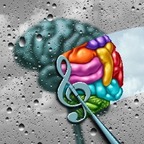Effectiveness of music therapy

Project leaders: Claudia Wild
Project team: Lucia Gassner, Julia Mayer-Ferbas
Laufzeit: Juni bis Oktober 2020
Sprache: Englisch mit deutscher Zusammenfassung
Publication: HTA Projektbericht No. 133: http://eprints.aihta.at/1280/
Background:
Music therapy aims at maintaining, restoring, and furthering physical, emotional, and mental health within a therapeutic relationship [1, 2]. It is used as a complementary, creative arts treatment for non-verbal communication and expression with the general goal to improve quality of life and to relieve symptom distress [2]. Music therapists treat individuals with psychosocial or physiological diseases by tones and rhythms; the therapy is an effective method to eliminate psychosomatic disorders [1]. It is offered in health-care settings such as geriatrics, psychiatry, oncology, and palliative care [2]. Active and receptive forms of music therapy as possible methodological approaches can be distinguished [2].
Music therapy as a health profession was legally recognised in Austria in 2009 (MuthG, Federal Act on the Professional Practice of Music Therapy, Federal Law Gazette I No. 93/2008) [3]. Every music therapist must be registered on the list of music therapists, maintained by the Federal Ministry of Social Affairs, Health, Care, and Consumer Protection [3].
The development of the last decades shows the numerical growth of the occupational group from 261 in July 2012 to 433 music therapists in June 2020 (http://musiktherapie.ehealth.gv.at/) [3, 4]. Since the number of training institutions has increased to three in recent years (University of Music and Performing Arts Vienna, IMC University of Applied Sciences Krems, University of Music and Performing Arts Graz), an even more significant increase in the number of professional music therapists can be expected in the future [3].
Aim of the project and research questions (RQ):
The project aims to provide decision support for the reimbursement of different music therapeutic approaches for various indications. The following research questions will be answered:
- RQ1: In which (psychiatric/psychological and non-psychiatric/-psychological) indications music therapy is used?
- RQ2: Which therapeutic music method is used for which indications? Active and/or receptive music therapy?
- RQ3: What evidence of effectiveness is available in the individual indications?
Methods:
The following methods are used to answer the research questions:
- RQ1: Scoping: Identification of all potential indications with the help of music therapists (expert interviews)
- RQ1: Selection of indications including psychiatric/psychological indications (e.g., dementia, depression, schizophrenia) and non-psychiatric/-psychological indications (e.g., neonatology, intensive care, pain patients)
- RQ1, RQ2, RQ3: Review of Reviews: Systematic literature search for reviews, selection using RoB / Risk of Bias instruments (AMSTAR), synthesis and, if necessary, update of the reviews for the various indications.
|
Description |
Project scope |
|
Population |
Children, adolescents and adults with medical indications (exclusion: prisoners/inmates/offenders) |
|
Intervention |
Active and receptive music therapeutic interventions |
|
Comparison |
Standard treatment and no treatment (e.g., waiting list) |
|
Outcomes |
Effectiveness outcomes of the individual indications
Safety outcomes
|
|
Study designs Settings Publication period Languages |
Systematic reviews/HTAs Inpatient and outpatient care 2010 – June 2020 English, German, Spanish |
Workflow is organized according to the principle of dual control (LG, JM); the results are subject to internal and external reviewers.
Time schedule/ milestones:
|
Period |
Tasks |
|
June 2020 |
Scoping with music therapists for indications Systematic search in several databases Selection of literature and acquisition |
|
July 2020 |
RoB assessment (AMSTAR) of the identified systematic reviews /HTAs, Selection and, if necessary, targeted update search |
|
August-September 2020 |
Synthesis of reviews (reviews of reviews) of selected indications |
|
October 2020 |
Peer review and publication |
References:
1. Li Y, Xing X, Shi X, Yan P, Chen Y, Li M, et al. The effectiveness of music therapy for patients with cancer: A systematic review and meta-analysis. J Adv Nurs. 2020;76(5):1111-23.
2. Kohler F, Martin ZS, Hertrampf RS, Gabel C, Kessler J, Ditzen B, et al. Music Therapy in the Psychosocial Treatment of Adult Cancer Patients: A Systematic Review and Meta-Analysis. Front Psychol. 2020;11:651.
3. Phan Quoc E, Riedl H, Smetana M, Stegemann T. Music therapy in Austria: A national survey study on the professional situation of music therapists. Musiktherapeutische Umschau. 2019;40(3).
4. Geretsegger M. Music therapy in Austria. Proceedings of Bridging Nations and Ideas. 2012 World Music Therapy Association Presidential Reports at the Seoul Summit Meeting; Seoul, Korea: Korean Music Therapy Association; 2012. p. pp. 43-53.















